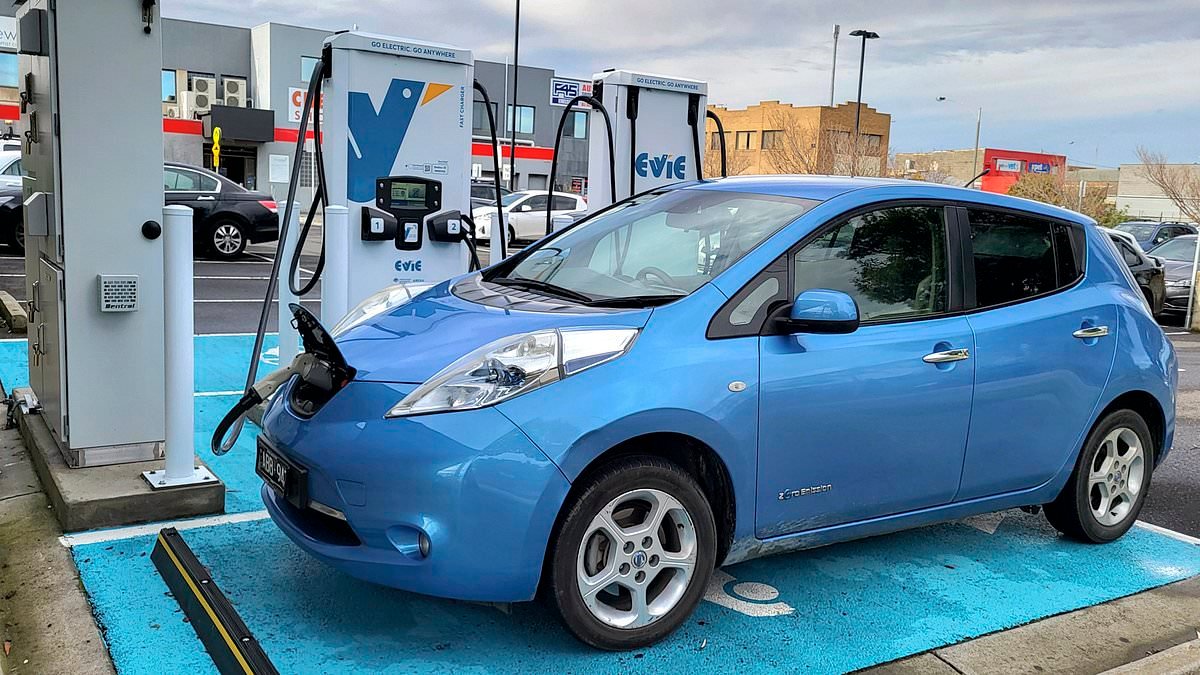By David Southwell For Daily Mail Australia
03:53 18 Jan 2024, updated 04:00 18 Jan 2024
Recharging an electric vehicle just became more expensive with Australia’s second largest operator hiking up prices at its stations.
Evie, which operates more than 200 charging stations nationwide, has hiked its prices by up to 43 per cent.
This will apply to the slowest chargers (22kW), which will jump from 35 cents per kilowatt-hour (c/kWh), to 50c/kWh.
The company’s 50kW fast chargers will increase by 16 per cent from 50c/kWh to 58c/kWh, while the ‘super-fast’ 150kW chargers will increase 13 per cent from 60c/kWh to 68c/kWh.
EV drivers will cop a 12 per cent increase if they use Evie’s so-called ‘ultra-fast’ 350kW chargers with the meter going from 65c/kWh to 73c/kWh.
This means to fully charge a Tesla Model 3 or Model Y rear-wheel drive with a 60kWh battery it will cost $9 more on a 22kW charger and $4.80 more for a 50kW, 150kW or 350kW charger.
Evie says a ‘typical charging’ session of around 25kWh of energy will cost ‘approximately $2 more’.
READ MORE: Aussie EV charging company praised by Anthony Albanese shuts its factory leaving up to 400 workers in the lurch before Christmas as it turns attention to US operations
‘This decision is driven by our commitment to investing in a top-notch, reliable, and expansive charging network across the country,’ Evie said earlier in the week when it announced the rises.
The hike marks the second time in six months the company has increased its prices.
Evie lags behind market leader Chargefox’s 300-plus stations but is well ahead of Tesla, which has around 80 sites.
The news comes as an added blow to EV owners after auto website CarExpert revealed it was cheaper to run a car with a combustion engine than an electric car on long road trips.
CarExpert founder Paul Maric told Daily Mail Australia on Wednesday he feared the gap would widen, even beyond the recent Evie announcement.
‘Electricity prices have never come down so it is only going to become more and more expensive,’ Mr Maric said.
‘They (governments) want everyone to be driving these things but ultimately they just aren’t affordable.’
He said so far electric vehicles were largely the preserve of the higher-earners, especially as buying one could be used as a tax offset against other income.
‘If you just think of the average Australian at the moment who is just struggling to put food on the table and you are talking about a vehicle like the Tesla model Y that starts at $70,000, regardless of what the tax incentives are that’s still a big chunk of money,’ he said
‘A lot of this stuff is pie in the sky that is really only benefiting people who are already wealthy.’
He also said because the federal government gave private companies money to install chargers but not for maintenance many were broken.
‘The public charging infrastructure is rolling out at such a slow pace that unless you have charging at home you would have nowhere to charge electric vehicles because chargers are either faulty or there is not enough of them,’ he said.
With a 325kw charger consuming the equivalent power that would drive over 170 typical reverse-cycle air conditioners Mr Maric said they put an enormous stress on the electricity grid, particularly in more remote areas.
‘Multiply the 325kw power use by the number of chargers on a site and that is how much energy you are demanding in that town,’ he said.
‘So, if you want to build out this network to have in regional Australia you would have to have these enormous power lines running to middle of nowhere just for an EV charger.’
The rising cost to run an electric vehicle will inevitably put off some Aussie drivers from swapping their petrol powered cars for an EV – in a blow to Prime Minister Anthony Albanese who is keen on creating a greener future.
Mr Albanese is already contending with several network charging companies pulling the plug on the country – including ChargePoint and Tritium.
Earlier this week US company ChargePoint announced it will shut down its network of almost 50 stations in a major blow to Prime Minister Anthony Albanese’s plan to turn Australia green.
The 46 stations in NSW, Victoria and Queensland will cease operation from February 1.
Australian EV charging company Tritium also recently closed its doors on its local factory before Christmas, leaving the jobs of up to 400 workers uncertain.
The troubled fast-charging firm announced the closure at the company’s annual general meeting that it would shut Murrarie, Brisbane factory on December 22.
[ad_2]
Source link




